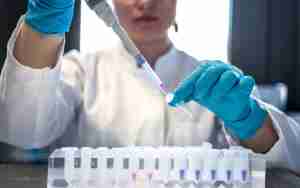INFLAMMATION & IMMUNITY
Get Tested for Inflammation, Build Immunity & Be Healthy
Neema Malhotra, M.D.
2730 Union Ave, Suite B
San Jose, CA 95124
(408) 684-8600
Inflammation and Immunity
Inflammation is a biological response of the body's immune system to harmful stimuli, such as infection, injury, or tissue damage, toxins in food, envirionment & chemicals. It is a natural process that helps the body to fight off harmful invaders and begin the healing process. However, chronic inflammation can contribute to the development of many diseases, such as cancer, heart disease, and autoimmune disorders.
The signs and symptoms of inflammation can include redness, heat, swelling, pain, and loss of function. Anti-inflammatory medications, such as nonsteroidal anti-inflammatory drugs (NSAIDs) and corticosteroids, can be used to reduce inflammation and relieve pain. In addition, lifestyle changes, such as eating a healthy diet, supplements, getting regular exercise, and avoiding tobacco, can help to reduce the risk of chronic inflammation.
Immunity refers to the ability of the body to resist infection, disease, or other harmful invaders. It is the result of a complex interplay between the body's physical and biological defenses, which work together to identify and neutralize harmful substances.
There are two main types of immunity: innate and adaptive. Innate immunity is present at birth and is composed of physical barriers, such as the skin, and biological mechanisms, such as fever, that provide a rapid, non-specific defense against a wide range of potential pathogens. Adaptive immunity, on the other hand, is a more specialized and specific defense mechanism that is acquired through exposure to a pathogen or through vaccination. Adaptive immunity can also "remember" a pathogen and respond more effectively if the same pathogen is encountered in the future.
A healthy lifestyle, diet that reduces inflamation, a balanced diet, food supplements that reduce inflamation and boost immunity, regular exercise, and adequate sleep, can help to support the immune system and maintain its ability to fight off infection. Vaccination is also a key way to build immunity to prevent infection by stimulating the immune system to recognize and respond to specific pathogens.
- ABSOULTE BASOPHILS
- ABSOLUTE EOSINOPHILS
- ABSOLUTE LYMPHOCYTES
- ABSOLUTE MONOCYTES
- BACTERIA (URINE)
- BASOPHILS
- COVID-19 ANTIBODY
- COVID-19 ANTIBODY, QUANTITATIVE
- EOSINOPHILS
- LEUKOCYTE ESTERASE
- LYMPHOCYTES
- NITRITE
- WBC COUNT (BLOOD)
- WBC (URINE)
- HEART HEALTH PANEL & DIABETES PANELS
may be added to determine inflamation levels.
Causes of Inflammation
Inflammation is a complex physiological response that is triggered by various stimuli, including injury, infection, trauma, toxins, and stress. Inflammation is a normal and essential part of the immune system's response to harmful stimuli, as it helps the body to remove damaged cells and tissues, and initiate the healing process. However, chronic inflammation can lead to tissue damage and contribute to the development of various diseases, such as arthritis, asthma, diabetes, heart disease, and cancer.
Some of the common causes of inflammation include:
- Infection: Inflammation is a natural response of the immune system to fight off infection caused by bacteria, viruses, and other pathogens.
- Trauma: Physical injury, such as cuts, burns, and bruises, can trigger inflammation.
- Toxins: Exposure to environmental toxins, such as pollutants, pesticides, and chemicals, can cause inflammation.
- Stress: Chronic stress can lead to inflammation by activating the immune system's response.
- Poor diet: A diet high in sugar, processed foods, and saturated fats can lead to chronic inflammation.
- Autoimmune disorders: Conditions such as rheumatoid arthritis, lupus, and multiple sclerosis are caused by the immune system attacking the body's own tissues, leading to chronic inflammation.
- Obesity: Excess body fat can trigger chronic inflammation, which can contribute to the development of insulin resistance and other health problems.
- Chronic diseases: Chronic diseases, such as diabetes, heart disease, and cancer, can cause inflammation as a result of the body's attempts to repair damaged tissues.
Reducing Inflammation & Building Immunity is key to Prevent Disease.
Testng for Inflammation & Immunity
The Immunity & Inflamation Profile is a simple blood test that identifies certain diseases that may be the underlying cause symptoms. Antibodies, or markers, associated with conditions such as autoimmune diseases, thyroid disease, Lyme disease, viral infections and anemia are measured. In some cases, one of these tests will be positive, suggesting a known condition may have triggered your persistent fatigue. However, in some cases no underlying disease can be identified.
How to Reduce Inflammation
There are several ways to reduce inflammation in the body, including:
- Eating a healthy diet: A diet that is rich in fruits, vegetables, whole grains, lean protein, and healthy fats can help reduce inflammation. Avoid processed foods, sugary drinks, and foods high in saturated and trans fats.
- Maintaining a healthy weight: Obesity can trigger chronic inflammation, so maintaining a healthy weight is important for reducing inflammation.
- Exercise regularly: Regular physical activity can help reduce inflammation by improving circulation and reducing oxidative stress.
- Getting enough sleep: Lack of sleep can lead to inflammation, so it is important to get enough restful sleep each night.
- Managing stress: Chronic stress can lead to inflammation, so finding ways to manage stress, such as meditation, yoga, or deep breathing exercises, can help reduce inflammation.
- Avoiding smoking and excessive alcohol consumption: Both smoking and excessive alcohol consumption can trigger inflammation in the body, so avoiding them is important for reducing inflammation.
- Taking anti-inflammatory supplements: Certain supplements, such as omega-3 fatty acids, curcumin, and ginger, have been shown to have anti-inflammatory properties and may help reduce inflammation in the body.
It is important to note that while these strategies can be helpful for reducing inflammation, it is also important to seek medical attention if you have a chronic inflammatory condition or are experiencing persistent inflammation. Consult your primary care physician or Dr. Malhotra.
When & How to Get Tested for Inflammation & Immunity
Inflammation is underlying cause for major diseases like diabates, heart disease, obesity and getting colds, flue and other diseases. These tests provide an insight working of the body and determine healthy holistics plan including food, medicine, lifestyle, exercise and managing stress and try, if such changes can improve symptoms. Should those fail, a visit to a speciality care provider typically results in a trial of treatments to address health concerns. There is no single test that can diagnose Inflamation or lack of Imminity. Instead, your physician may need to rule out other causes before providing a diagnosis and treatment plan. There are test panels available as described earlier to determine inflammation.
How to Build Immunity
There are several ways to build immunity to fight disease:
- Eat a healthy diet: A balanced diet that is rich in fruits, vegetables, whole grains, lean protein, and healthy fats provides the vitamins, minerals, and nutrients that support a healthy immune system.
- Stay hydrated: Drinking plenty of water helps flush toxins from the body and keeps cells hydrated, which is important for immune function.
- Exercise regularly: Regular physical activity improves circulation and helps the immune system function more efficiently.
- Get enough sleep: Restful sleep is essential for the body to repair and regenerate, which is important for immune function.
- Manage stress: Chronic stress can weaken the immune system, so finding ways to manage stress, such as meditation, yoga, or deep breathing exercises, can help support immune function.
- Avoid smoking and excessive alcohol consumption: Both smoking and excessive alcohol consumption can weaken the immune system, so avoiding them is important for maintaining strong immunity.
- Practice good hygiene: Regular hand-washing, avoiding close contact with sick people, and keeping surfaces clean can help prevent the spread of germs and reduce the risk of infection.
- Consider vaccination: Vaccines are a safe and effective way to build immunity to specific diseases, such as flu, measles, and polio.
- Take immune-boosting supplements: Certain supplements, such as vitamin C, zinc, and echinacea, have been shown to support immune function and may be beneficial in building immunity.
It's important to note that while these strategies can help support a healthy immune system, they do not guarantee immunity to all diseases. It is still important to practice good hygiene and seek medical attention if you are experiencing symptoms of illness.
Make an appointment to a consult with Dr. Nema Malhotra to confirm if testing is right for you and determine a holistic treatment plan.
Contact Us for Inflamation & Immunity Concerns
(408) 684-8600
















